Preface:
After Hitler failed in his attempt to stage a coup against the government of the German province of Bavaria in November 1923 AD, he was arrested and imprisoned. He wrote his bookmarked "My Struggle" while he was in detention, in which he mentioned (something of) his colonial plans, and in which he stated the necessity of the expansion of the German people, first by annexing all lands inhabited by Germans in other countries with one country and rebuilding the Third Reich (the third German Empire),
Then by controlling Central Europe and expanding to the east as well. After Hitler and the Nazis came to power in 1933, he began to implement his colonial plans and aspirations slowly, starting from Austria and Czechoslovakia, passing through Poland and the countries of the western front from France, Britain, Norway, and Sweden, all the way to his dispute with the Soviet Union and his entry into the Russian lands. He started his first steps out of the League of Nations in the same year in which he came to power because the League and the significant authorities refused to allow Germany to rebuild its military forces like other countries.
He held a referendum in the Saarland region to annex it to his rule, and the poll was in his favor. He re-compulsorily recruited, so he began preparing his army and establishing military industries.
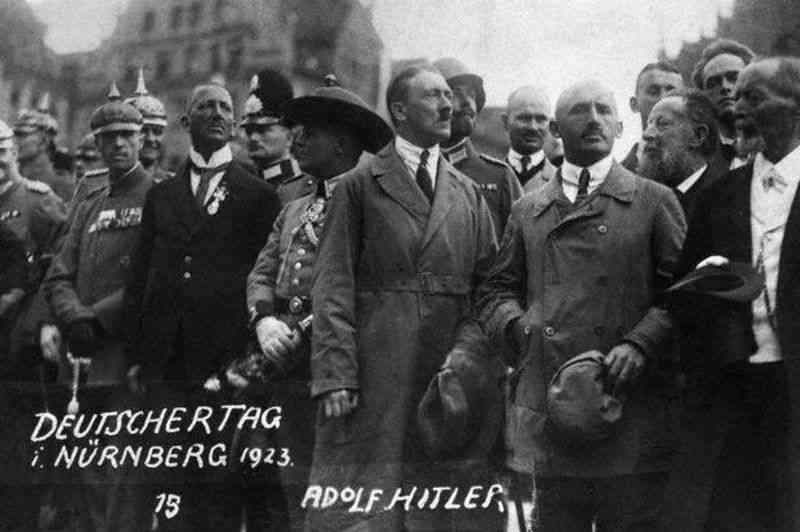
The annexation of Austria to Germany:
The majority of the population of Austria belonged to the German race. The importance of its geographical location to reach Czechoslovakia and Italy, in addition to the political crises that existed in Austria and the Nazi penetration in it, where they controlled the Ministry of the Interior and the leadership of the army and the secret police, helped Hitler and paved the way for its sweep.
In July 1934 AD, the head of the Austrian Socialist government was assassinated by a Nazi. The Nazi Party in Austria carried out extensive propaganda accusing the Austrian government of persecuting the Germans, then Hitler issued an ultimatum to the Austrian Chancellor "Schucing" to hand over power in the hands of the Nazi Party, so "Schucing" decided to hold a referendum to find out the opinion of the people about this.
Hitler rejected this and threatened him, asking him to resign and leaving the chancellor to "Sees Enkart," the leader of the Nazis in Austria. On March 12, 1938, Hitler entered Austria and controlled it quickly, bringing seven million people to his rule.No one opposed Hitler in annexing Austria in the Nation League, although Austria was a member.
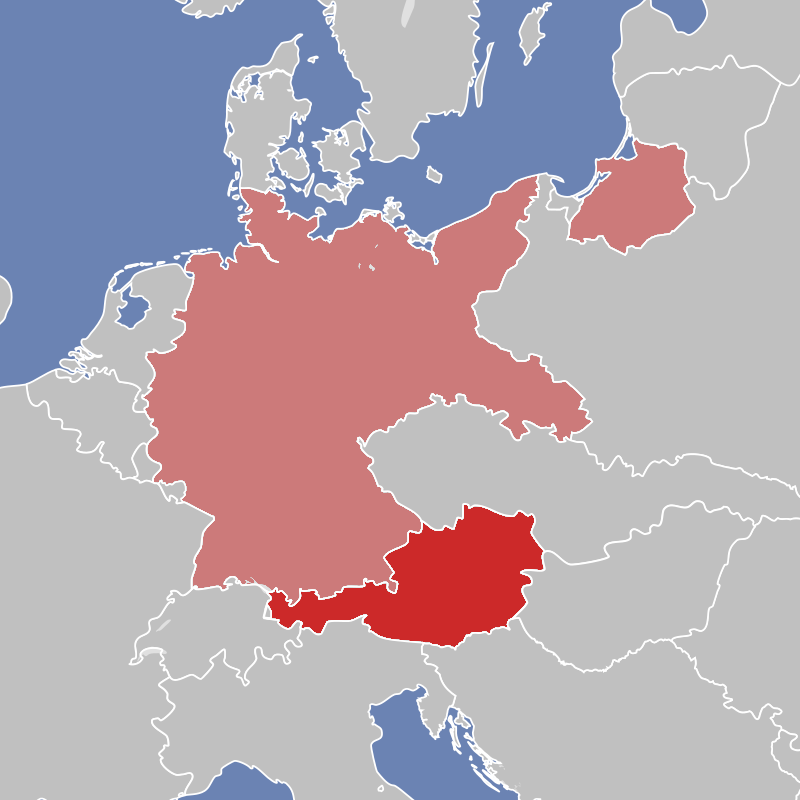
Czechoslovakia:
Hitler's ambition to control Czechoslovakia, which was rich in natural resources, and to stand in front of the Germans' arrival at the Danube river, in addition to the presence of three million Germans in the provinces of "Bohemia and Moravia" (Sudet Region), which was annexed to Czechoslovakia under the Treaty of Versailles in 1919.
That is why Hitler began inciting the inhabitants of the Sudeten to unite with Germany. The leader of the Germans demanded the Sudetenese to seek independence from Czechoslovakia while recognizing the German nationalism, strife erupted in the Sudeten, and the Nazi party in the region began to spread propaganda for the persecution of the German minority and asked for help from Germany, so Hitler sent an ultimatum to the Czechoslovak government on March 28, 1928 AD, to evacuate the Czech armies from the Sudet region, but the government rejected this warning.
As for the international situation, France, England and the Soviet Union announced its willingness to provide assistance to Czechoslovakia if Germany was exposed to it, while Italy stood with Germany in its decision.
Munich conference:
On September 28, 1938, US President Roosevelt sent an appeal to the states mentioned above to hold a conference and discuss the Czechoslovakia issue. Mussolini convinced Hitler of the idea of the meeting.
The conference was held on September 29, 1938, in the German city of Munich, with the Presidents of Germany, Italy, France and England banned, and the Soviet Union and Czechoslovakia were not invited to attend the conference. Conference decisions: The meeting decided to disembark upon Hitler's desire and hand over the Sudeten regional government.
Indeed, the Czechoslovak employees were evacuated on October 1, 1938 AD. Also, among the decisions of the conference was to leave any land inhabited by more than 50 percent of the Germans to German control.
The division of Czechoslovakia:
After the conclusion of this conference, Poland annexed the Altechin district to it. Slovakia and routinely separated from the central government in Prague, As for Slovakia, at the request of its president, it became a German protectorate, And regularly, Hungary took control of it on March 14, 1939, Mussolini took this opportunity and occupied Albania. Hitler forced the president of Czechoslovakia "Emil Hasha" to sign an agreement that made Czechoslovakia protected by Hitler, and he completed the annexation of Slovakia after its secession.

Poland: (World War II):
Hitler still aspires to expand in neighboring countries, controlling Central Europe ... to obtain (Ukraine's wheat, Caucasus oil, coal, and iron mines in the Urals). Now it is Poland's turn to face a fate in the face of the Nazi advance. After a secret agreement concluded between the Soviet Union and Hitler on August 23, 1939 AD, the two countries guaranteed the division of Poland, the Baltic region, Finland, and Romania, as well as friendship, cooperation, and non-aggression between the two parties.
Germany obtained the western part of Poland and the Soviet Union got the eastern part of it. The main reason that Germany took an argument to proceed with the fulfillment of its aspirations was its request from the Polish government to obtain the city of Danzing, which has some villages and an essential port for trade that was carved out of German lands under the Treaty of Versailles in 1919 and placed under the supervision of the League of Nations and a Polish administration, but the Polish government refused this.
This led Hitler to open two branches of the Nazi Party to spread claims and rumors of the persecution of the German minority. Hitler had masterminded an incident of German soldiers on the German border and accused the Polish forces and decided to invade Poland without warning. It actually ran out, On the dawn of September 1, 1939, German planes marched on the Polish sky and bombed Polish airports and air forces, destroying it before taking part in the battle and paving the way for ground forces to sweep Poland.
Within one week, the Polish troops were besieged in Warsaw. At the same time, Russian troops were advancing on the eastern Polish territories, implementing that agreement with Germany. Warsaw did not hold out long before the siege, as it fell on September 27, 1939 AD, as Hitler ordered his army commanders to end the blockade and bombard it with planes and artillery, so he executed his order and completely destroyed the city, followed by the spread of the Thunderbolt forces and the Gestapo, which committed terrible massacres against the population.
The international situation from Hitler's invasion of Poland:
Britain sent a threat to Germany on September 3, 1939, to withdraw its forces from Poland, followed by sending 350,000 soldiers to the Belgian coast to ease the fighting on Poland. France followed Britain's example regarding the threat, but did not send any forces and did not show any military response, as the situation and public opinion were dispersed and separated between supporters of the reaction to Germany militarily and those who called for peace. As for Italy, it has stood on the fence, and Mussolini tried to calm things down. After that, Britain and France declared war on Germany for violating the charters, occupying Poland and dividing it with the Soviet Union
Partition of Poland:
The battle ended, and Poland was divided into an eastern section under Soviet sovereignty and a western section under Nazi sovereignty. On the 17th of September 1939, the Soviet Union announced that Poland had disappeared from the map and there was no such thing as Poland. One of the reasons for the defeat was the variation in the number of troops and military equipment. Germany had 54 divisions and about 2000 aircraft, while Poland did not possess more than 29 divisions and 310 warplanes, most of which were destroyed in the bombing of the first day of the war. The antique, which does not exceed a few dozen, while Germany had sophisticated tanks, aircraft and communication devices.
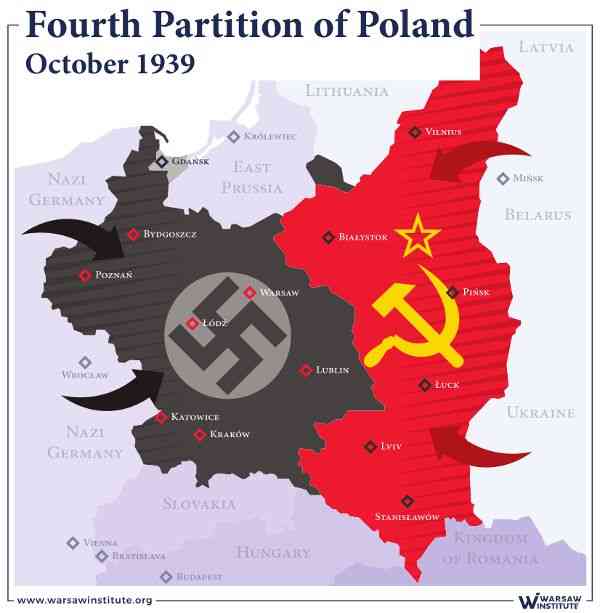
Occupation of the Western Front:
The western front, made up of Belgium, the Netherlands, Luxembourg, and France, was Hitler's next target. France was aware that its role would come after declaring war on Germany. That is why it fortified its borders with Germany and built, fortified and mobilized the "Maginot" defense line on the other hand, the Germans put the "Siegfried" line as a defensive line against the French "Maginot" line. Hitler, respectively, occupied Denmark, Norway, Luxembourg and the Netherlands, striking and sweeping it without warning.
On April 9, 1940, the German armies invaded and occupied Denmark and Norway. Then, on the same day, they sent forces along the Norwegian coast, and the Danish president and his government fled to Britain. The next day, large troops entered and occupied Luxembourg within hours, then the Netherlands was bombed by aircraft, and five days later, the Dutch army surrendered. She went to Belgium and dealt considerable blows to its small army.
Hence, its king sought help in France and Britain, and Germany sent to it the Nazi forces, under the leadership of "von Rendstadt," which destroyed the defense line and swept Belgium completely. Here the French army morale weakened and fled fleeing erratically.
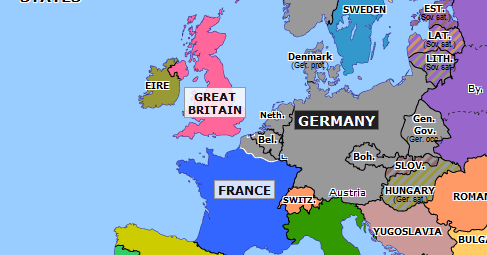
France:
On May 19, 1940, the commander "Wigan" became commander of the French army and coalition forces and tried to carry out a counter-attack to the Germans from the north. Still, he failed miserably, and the Germans were able to besiege the French, English and Belgian forces in a triangle-based in the city of "Dunkirk."On May 27, 1940, the Danish army surrendered. The English army continued to fight, and there was no solution but to evacuate the forces towards British shores. With great difficulty and under German bombing, about 336,000 soldiers were transferred to the British coast.
On June 12, 1940, the German forces arrived in Paris, and the Germans entered them on June 15, so the government resigned and was replaced by a new government led by Marshal "Petan," who asked the Germans to stop the fighting and armistice. The armistice stated:1 - The Germans occupy all French lands north and west of a line that runs from Geneva to Tours to the borders of Spain to the south.2- All French ports are entered in the occupation area.3- All French forces are disarmed, handed over to German authorities, and all recruits are released, except for a symbolic power of only 100,000 to maintain security.4- France bears all the expenses of the German army on its soil.5- France will release all Germans, and Germany will keep its French captives. French public opinion was dispersed between the right (supporters) and the left (opposition).
This brought the northern part of France under German occupation, and the southern part of the Geneva line to Tor until the Spanish border under the control of the pro-German Vichy government. The Free France government was established in London under the leadership of General "de Gaulle" on June 18, 1940, who refused to surrender and urged resistance to get rid of German colonialism.
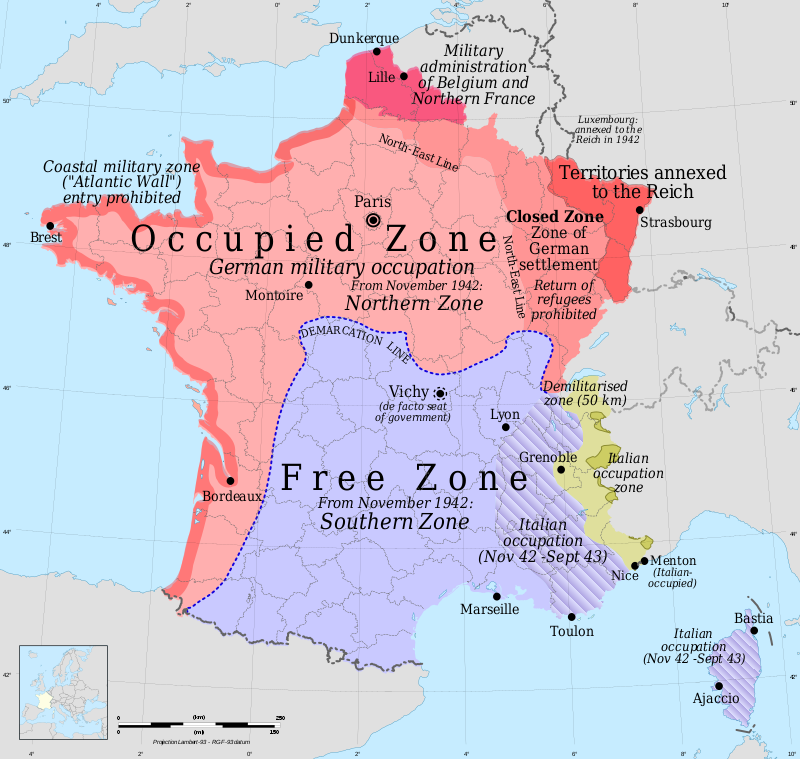
Eastern Front:
Germany violated the non-aggression treaty with the Soviet Union, entered the territory of the Soviet Union without warning and attempted to isolate the Western Front of the Soviet Union from the central command in Moscow. In the summer of 1941, they launched a large-scale military operation, "Operation Barbarossa." Hence, German forces superior to Soviet forces launched. The troops were The Soviets were totally unprepared for this war, with inadequate supplies to the Russian troops, especially weakness in the Soviet leadership after the liquidation carried out by Joseph Stalin to the Soviet leaders to prevent a coup inside the Soviet leadership. The German forces penetrated until they reached the Moscow borders from the borders of the Soviet capital and besieged "Leningrad" They surrounded the city named after the leader of the Soviet Union, "Stalingrad."But they failed to enter "Leningrad," and their army was broken in "Stalingrad."
The Battle of Stalingrad was a sharp blow to German plans, and it showed terrible that Hitler's matter was absolute and no one should discuss it and express his opinion. The war on the Eastern Front lasted for more than 4 years between a German attack Soviet defense and after that, a German loss on various fronts, a Soviet attack, and a Soviet sweep also for all the sites occupied by Germany within the territory of the Soviet Union. But Hitler declared war on the Soviet Union without warning and lay the provisions for his control of some Soviet lands rich in natural resources such as oil in the Caucasus and wheat in Ukraine.
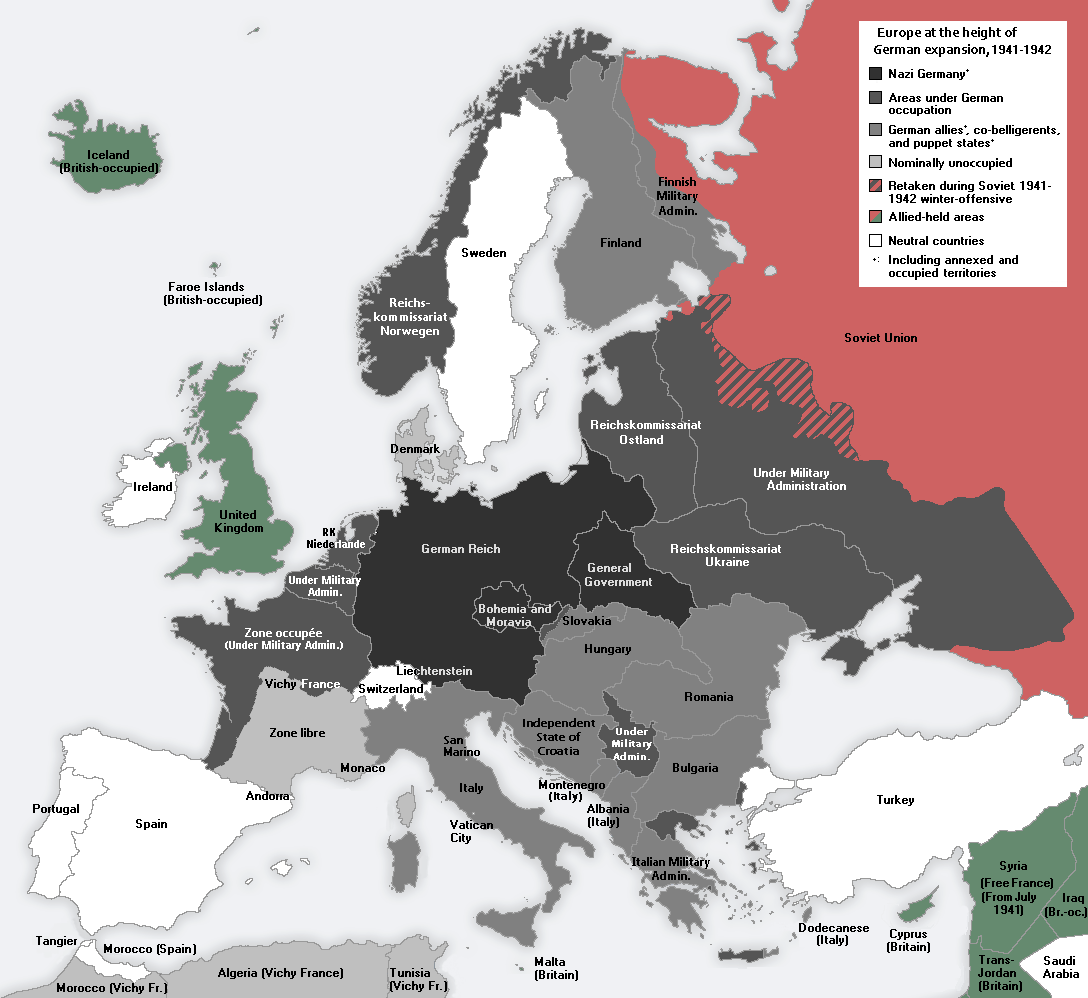
Conclusion:
After all these expansionist and German imperialist ambitions, Hitler began reaping the result of his military actions that he carried out because of "paranoia." The Soviet forces stopped Germany's progress in its territories and attacked Germany in a reverse war and sweeping all the areas occupied by Germany. On the western front, the American forces landed their forces on the Normandy coast, specifically on Omaha Beach.
This was considered the third defeat of the German troops after the battle of "Stalingrad" and the battle of "Kursk." The countdown to the German forces began to lose, so the American soldiers and allies in the West started to advance against the German troops. On the Eastern Front, the Soviet forces started to rapidly develop towards Berlin.
They inflicted consecutive defeats on the German armies until the German troops entered Berlin in 1945, declaring the end of Nazi Germany and the end of Hitler, who committed suicide. All of these wars that I mentioned left more than 60 million people dead and for what they were killed and for what reason? And for what? Was this crazy of Hitler to expand his "kingdom"? Or was Hitler a psychopath ?! Or was Hitler a true national hero in what he did ?! It's your choice...


